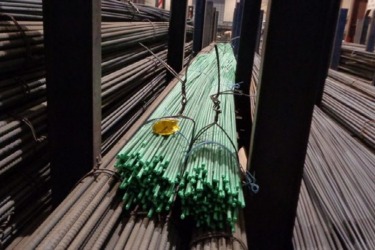What do you get when you combine the compressive strength of concrete with the tensile properties of steel? Answer: A marriage made in heaven. These two impressive building materials are the superheroes of construction, each with their unique powers. However, used alone, the brittle nature of concrete can mean an early structural demise under constant loads and in the ever-changing thermal environment. Plus, earthquakes can transform a lovely high-rise into a people-crushing pile of rubble in the blink of an eye.
LIKE GOOD DANCE PARTNERS
However, when good concrete is poured over bones of steel, it can withstand loads for a century or more, diverse temperature ranges and, if designed well, even earthquakes. Because thermal changes affect steel and concrete at the same rate—they expand and contract together—they make perfect partners for any kind of concrete construction. Sometimes, architects grant some visibility to steel elements, but usually it’s meant to be invisible support in the form of embedded reinforcement bar, rebar. In complicated structures, both commercial and residential, rebar needs to be formed to the proper specifications by a rebar fabricator.
The concept of rebar fabrication may conjure up images of a milling operation whereby rebar comes out all ready to be installed in a construction project. In reality, were that the case, the countryside would be fairly covered over with steel mills. Rather, regional mills turn scrap steel into long lengths (up to 60 feet) of rebar in various diameters, then ship them to industrial fabricators. The rebar fabricator then cuts and shapes the bars for local use.
CUSTOMIZATION IS KEY
Only the simplest and smallest concrete structures can get by with straight, single lengths of rebar. But anything larger or more complicated than, say, a backyard patio will probably need a reinforcement plan that may include an armature of bent and connected rebar. A fabricator manipulates each bar in the design to create proper lengths, bends and connections exactly as the architect requires. Wise designers will work closely with a rebar fabricator with an in-house engineering department. Because each bar in the design must work together with all the others in the grand scheme, the custom fabricating house can offer detailed help in how best to build the steel skeleton.
IN-SHOP BEND AND CUT ARTISTRY
Once the engineering plans have come together into a sensible whole, the rebar fabricator cuts, bends, and finishes the ends of each bar to specification with power equipment. Since bending steel alters its strength at the bend, it must be done very carefully to meet code requirements and avoid liability if the structure suffers an unthinkable catastrophic failure. If the bar becomes split or broken during the process, it gets tossed to the scrap heap and a new bar goes through the bending machines to replace it.
ON-SITE, HANDS-ON HELP
A truly great rebar fabricator can also send expert teams to the job site to help construct the rebar edifice. Having all the inside knowledge of the project, a fabricator crew can site weld and compile the pieces on behalf of the general contractor. This handy service saves on job costs and lessens the potential for confusion and errors as the project takes form.
In Colorado, Barton Supply has provided rebar fabrication and field construction teams to many a concrete structure since 1973. With our fingerprints on bridges, skyscrapers, steel-frame buildings, shopping malls, multi-family housing and office complexes as well as residential foundations, window wells and walls, we’re fully integrated into our special Colorado community. We believe in offering the best rebar fabrication services to our state. Please give us a call for end-to-end help on your concrete building project.
